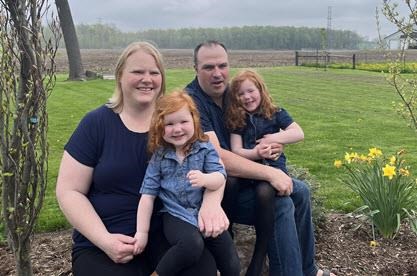Julie and her husband Mike have two daughters, Lena and Ellie
By Diego Flammini
Staff Writer
Farms.com
Mother’s Day is this weekend (Amazon can probably deliver your package on time if you order now!), and Farms.com is speaking with ag moms to get their thoughts on parenthood and share memories they have with their own mothers.
This Q&A features Julie McIntosh (JM), an egg and sheep producer from near St. Mary’s, Ont.
She and her husband, Mike Ready, have two daughters – Ellie, who is turning five in June, and three-year-old Lena.
“Ellie has the best little laugh and an eagle eye, she doesn’t miss a thing,” McIntosh told Farms.com. “Lena is miss independent and likes to do things her own way. She has a swing that she loves and could spend hours in it.”
Farms.com: Where were you when you found out you were pregnant for the first time? How did it make you feel?
JM: It was an answer to a dream. We always hoped to be parents and wanted to raise kids on our farm.
Farms.com: Describe the feeling of holding a newborn for the first time.
JM: It’s an amazing experience. That initial skin-to-skin contact is so special. You will never forget it.
Farms.com: What’s the best part about being a farm mom?
JM: Getting to raise them in the country like how I grew up.
Farms.com: What’s the hardest part about motherhood?
JM: Finding balance. Both Mike and I have off-farm jobs as well. Obviously, the kids and the family is the most important, but there is the pull of other things. Watching them grow up and those last firsts is pretty tough too. You wish they could stay in certain stages of life a little longer.

Julie McIntosh holding Lena and Mike Ready holding Ellie.
Farms.com: What’s a misconception people have about motherhood?
JM: Before you have kids, you think it’s going to be easier than it is.
Farms.com: What’s your mom’s name? What are some special memories you have with her?
JM: My mom’s name is Eleanor. She raised five kids on the farm and is the most patient and kind person I know. She and I talk every day, so I’m lucky we’re able to continue making memories together.
Farms.com: What’s one lesson you learned from your mom that you try to teach your kids?
JM: My mom was fairly involved in the community, and I am as well too, so that’s something I’d like to pass onto the girls too.
Farms.com: How has parenthood changed you?
JM: I’ve slowed down to enjoy the special moments. I make more of an effort to carve out time for little picnics or to go to the park.
Farms.com: What’s one thing all parents have in common no matter where they are in the world?
JM: I think we all have a goal of wanting to raise kids to be successful and go into the world to do great things and be great people.
Farms.com: What’s one piece of advice you have for new moms?
JM: Mom guilt is a real thing, so don’t feel guilty for feeling guilty. Everyone says to enjoy every moment because time goes so fast. But there are moments that aren’t enjoyable with babies and toddlers. Life gets stressful and there are sleepless nights. It’s okay to not enjoy every moment.
If you’ve enjoyed this farm mom Q&A, here are some others you can check out.
Angela Cammaert, a cattle and grain producer from Elgin County, Ont., says the hardest part about motherhood is not being a helicopter parent.
Sheila Hillmer, a beef producer from Del Bonita, Alta., says all parents are writing the rules as they go.
Josie Pashulka, a beef and grain farmer from Derwent, Alta., says holding a newborn baby brings a rush of love you never knew you could have.
Trish Cook, a hog farmer from near Winthrop, Iowa, says holding a newborn felt like a miracle and natural at the same time.
And Jamie Beyer and Gail Donkers are two cash crop producers from Minnesota.
Beyer says the best part about being a farm mom is her kids realizing how close the family really is. And Donkers says her one-pot beef stroganoff reminds her of her mom, Pat.